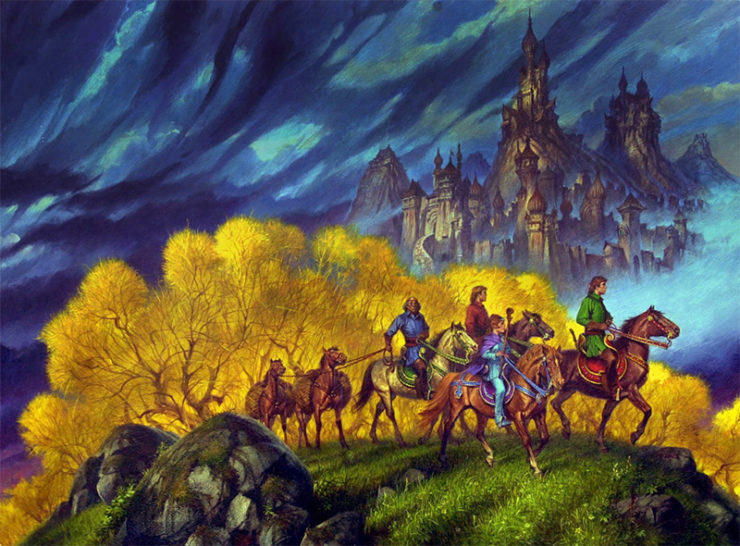A question has always nagged me whenever I read the Wheel of Time: Where are the lions? The Savanna cats are the standard of Andor, a large country with a long history and a very prominent place in the storyline. But we only see an actual lion once, in The Shadow Rising, Chapter 11, while Egwene is dreamwalking in Tel’aran’rhiod and idly observes Aiel ‘Wise One’ Amys hunt a “boar” in the Waste. Given that it’s possible to mentally create a creature in the World of Dreams, the lion Egwene saw could be merely a construct of her or the Wise One’s imagination—although to accurately imagine a lion, one would probably have to have seen one in real life. (Unless Tel’aran’rhiod can fill in the details if a Dreamwalker attempts to imagine a lion?)
So, maybe there are lions in the Waste. But this leads to more questions, because if there are lions, then surely there must be giraffes, elephants, and zebras for the carnivores to munch on. Despite fifteen books worth of adventuring, these species remain unseen. So where are ANY of the animals?
The Wheel turns and ages come and go, including our own. We don’t know how long an age on the wheel can be, but presumably it’s not long enough for a recognizable animal like a lion, giraffe, or zebra, to go extinct and then re-emerge in time to be abundant in the present day. Unless they’re all hiding in a pocket dimension, like the grolm. Which would mean that somewhere there is a pocket dimension FULL OF GIRAFFES AND…wait, where was I?
We’ve seen quite a bit of the continent that the main storyline is located on, as well as its various biomes. (Or its suspiciously non-various biomes, as some may point out.) But… there are few reports on what the Land of Madmen and Shara are like—the former being largely unexplored on account of its inhabitants sheer aggressiveness, while the latter is literally walled off and inaccessible to those outside of Sharan society. Surely some animals could live there, or even in Seanchan, a continent larger than Shara, and one that stretches from the planet’s northern icecap to well below the Equator. Geographically it’s a bit like North and South America, but more culturally homogenous. Could there be lions there? Or in Shara?
Below is my initial attempt at a worldwide bestiary. It begins with a list of animals known to exist in the Wheel of Time, then moves onto those animals that could possibly exist but are not confirmed, sorted first by continents/Named-swathes-of-land and then the possible biomes/habitats that exist in each continent, followed by a sample of animals from such a biome.
Known Animals
The Westlands (“Randland”)
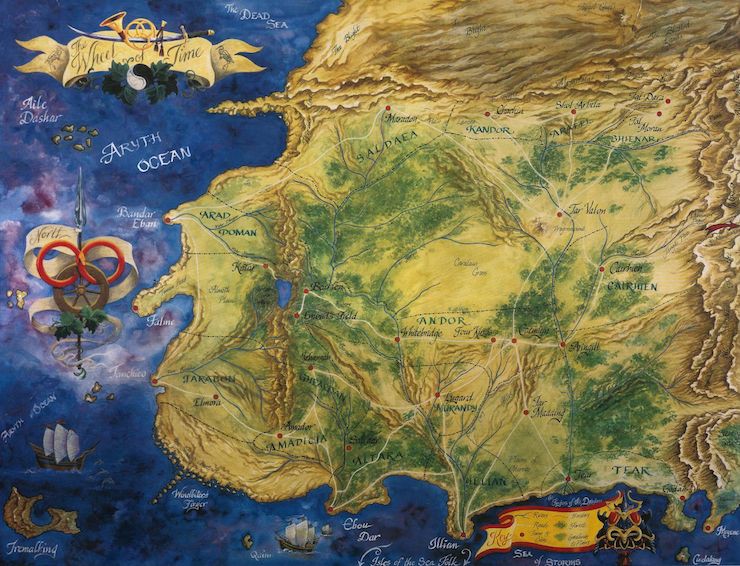
The fauna in Randland is well documented, both in the series itself and in the two non-fiction companion books The World of Robert Jordan’s The Wheel of Time and The Wheel of Time Companion, and although the majority of the story’s main continent is a forest and plains biome, the swamp/rain forest environment of the Drowned Lands adds some variety. Here are animals we’ve seen in the series or that the author has documented in companion works:
- Bats
- Bears
- “Bitemes” (Mosquitos or gnats)
- Blacklances (Snakes)
- Cats
- Deer
- Dogs
- Forkhorn (Waist-height Deer)
- Nedar (“A tusked water pig.”)
- Red Foxes
- Horses
- Rabbits
- Ravens
- Sheep
- Silverpike (Fish)
- Snakes
- Soetam (Giant rat)
- Spikehorn (Knee-height Deer)
- Swamp cat (Large mottled greenish-gray cat)
- Tropical birds
- Water Lizards (Alligators or crocodiles)
- Wolves
The Aiel Waste
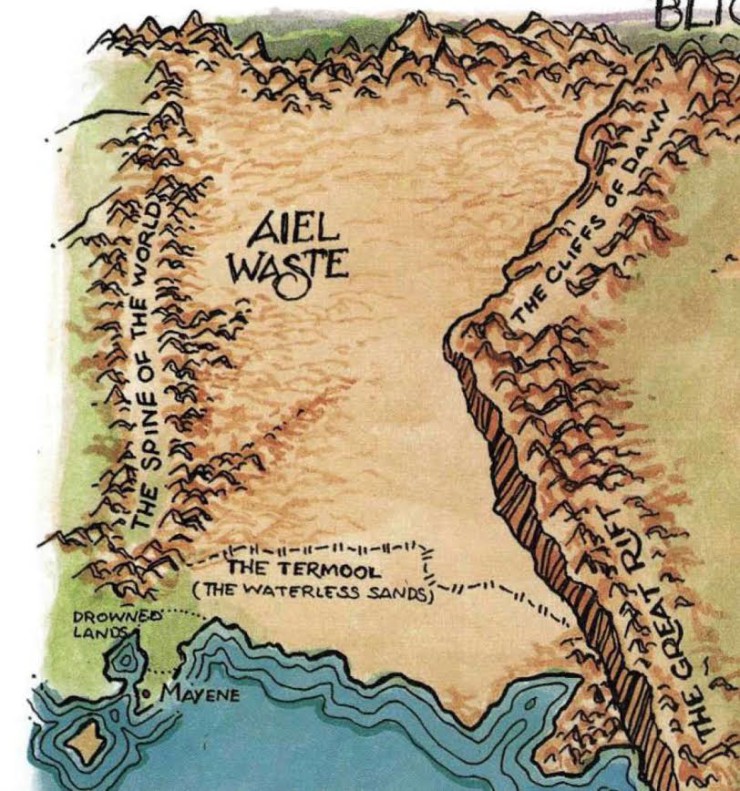
The Aiel Waste is a harsh land, badlands and scrub desert covering nearly the entirety of it. These break down into the Waterless Sands to south, becoming the ever-shifting dune desert that gives the land its name. To the West is the Spine of the World, which has three branches extending into the Waste, bringing mountainous footholds into the desert. In the North, the Mountains of Dhoom serve a similar function, although living in the foothills of the Blight is arguably suicidal. At it’s eastern edge is The Great Rift, a long canyon that extends downwards into the Earth in steep cliffs 1 to 3 miles deep, which serves as the barrier between the Aiel Waste and Shara.
The Aiel Waste is a diverse desert, holding mountains, scrub desert, badlands, canyons, and dunes. It’s highly possible that the dryness of the Aiel Waste comes from the mountains surrounding the land on three sides, which would force wet air up, collecting moisture from the sun-beaten ocean to the south and creating large storm clouds that unload their waters into Shara and Randland. Not unlike how the Himalayas push wet air up in India, forcing condensation earlier and bathing their southern slopes in rain while leaving the Tibetan Plateau dry.
Animals that we know live in the Aiel Waste:
- Bloodsnakes (Venomous Snakes)
- Capars (Boar-like animals with pointed snouts, clawed toes, and sharp teeth)
- Garas (Large Venomous Lizard)
- Mountain Kings (Venomous Snake)
- Sorda (Desert Rat)
- Two Steps (Venomous Snake)
Seanchan
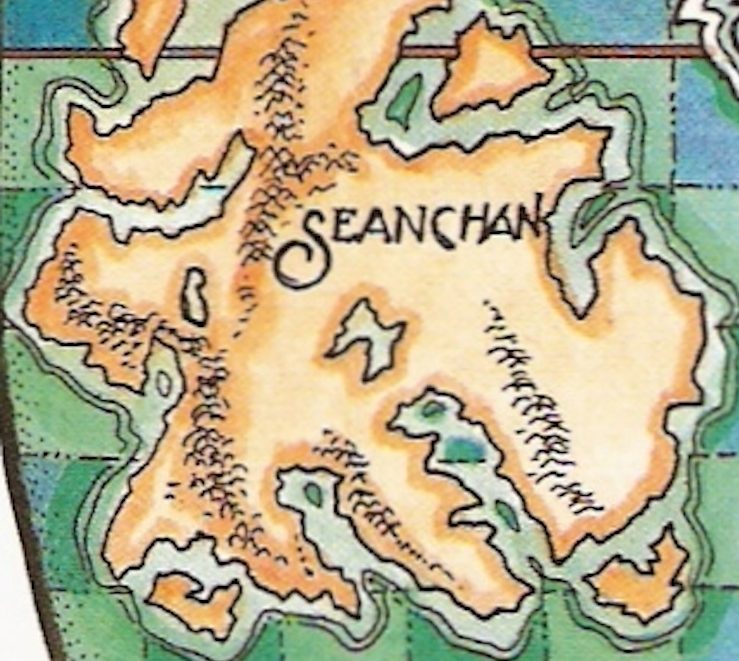
The Seanchan animals seen within the Wheel of Time are unique in that they originated in parallel worlds, presumably having been brought over by using the Portal Stones to aid in the fight against the Shadowspawn sometime in the first 1000 years after the breaking. Only the S’redit (elephants) seem to not be used for fighting on a regular basis, with the rest of the “parallel world” animals having been adopted into Luthair Paendrag’s armies after the conquering of Seanchan. These animals multiplied and became part of Seanchan’s wild ecosystem, though many are still held by the Seanchan for their army or as exotic pets and guards.
- Corlm (Large carnivorous and flightless “birds” covered with long mottled fur and a flat fan shaped tail.)
- Grolm (Likened to the appearance of a toad the size of a bear with three eyes and a beaked mouth.)
- Lopar (A hulking animal resembling a bear with a round head, they have a hairless, leathery hide. They can reach 10 feet in height standing on their hind legs.)
- Raken (Large flying animals with leathery gray skin and horned snouts, they are fast and agile fliers but are awkward on the ground.)
- S’redit (Elephants by a different name, they are similar to Asian Elephants.)
- To’raken (Larger and slower species similar to the Raken, but with a brown to reddish hide. The closest the series gets to actual dragons.)
- Torm (Fierce predators resembling large cats with three eyes, bronze scaled bodies, and six clawed paws. They’re highly intelligent and good puzzle solvers.)
Ocean
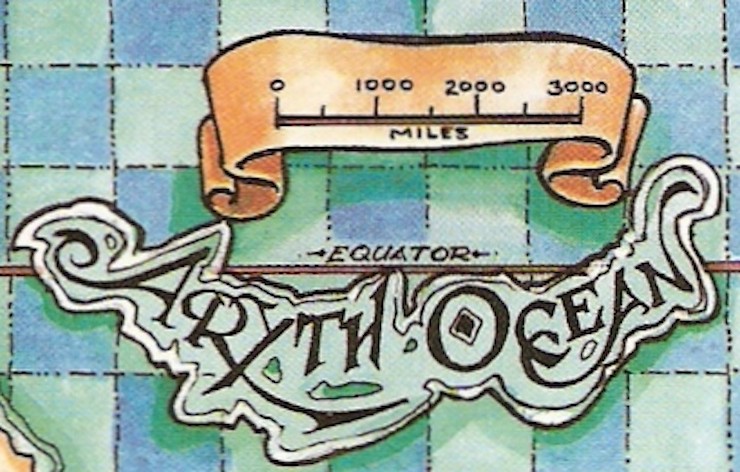
The Wheel of Time isn’t overly fond of describing its oceans, spending about as much time with them as it did with Narg, the Talkative Trolloc. (Which is to say, very little.) Aside from Suian’s constant fish-based metaphors, the only time we get to spend with The Wheel of Time’s oceans is when Nynaeve and Elayne travel on a Sea Folk ship to Tanchico and spot some dolphins following them.
- Dolphins
- Eels
- Fangfish (Possibly sharks.)
- Fish (General)
- Lionfish
- Silverpike
Assumed Animals
Randland
The Westlands are known for being covered by woods and plains—broken up by the occasional mountain range—giving an altogether very European feel. In actuality, these biomes are far more ecologically diverse than what we see in The Wheel of Time, so we can safely assume that the following animals are present in The Westlands/Randland even though we don’t really see or interact with them.
- Deciduous Forest/Woodland
- Adders
- Avian life (General)
- Badgers
- Deer
- Deer Mice
- Ducks
- Frogs
- Garter Snakes
- Hedgehogs
- Hummingbirds
- Lizards
- Opossums
- Owls
- Skunks
- Squirrels
- Swallows
- Toads
- Turtles
- Weasels
- Wild boars
- Wood Grouses
- Grassland
- Buffalo
- Coyotes
- Elk
- Golden Eagles
- Voles
- Swampland/marshes
- Bald Eagles
- Bobcats
- Boa Constrictors
- Caimans
- Crawfish
- Crocodiles
- Egrets
- Frogs
- Geese
- Herons
- Marsh Flies
- Toads
- White Tailed Deer
- Mountains/Rivers
- Fish (General)
- Fresh Water Shrimp
- Hawks
- Meadow Mice
- Mountain Goats
- River Otters
- Domesticated/Partially Domesticated
- Chickens
- Cows
- Geese
- Goats
- Pigs
- Oxen
The Aiel Waste
Although arid and seemingly barren, deserts can be surprisingly full of life. Animals there have adapted to be more efficient and live on less water. Due to the arid climate, we can assume that there is no savanna in the Waste, as there is not enough water to sustain plant growth on that vast a geographical scale. The Waste most likely contains the same kind of life one would find in the Australian outback, the southwestern U.S., and the Arabian Peninsula.
- Desert
- Bactrian Camels
- Desert Lions
- Donkeys
- Fennec Foxes
- Kangaroo Rat
- Tarantulas
- Mountains
- Big Horn Sheep
- Cougars
- Mountain Goats
- Vultures
Shara
Shara is an extremely closed off country, and only Sharans truly know what the interior of their country looks like, but I suspect it is largely savanna, spreading out from around a central desert. The east and southeastern coasts most likely contain wetter climates that can support plains and scrub forests. Most interestingly, the rainfall on the Sharan side of the mountains bordering the Great Waste could be great enough, especially near the equator at the southern tip of the country, to produce a rainforest!
- Savanna
- Baboons
- Cape Buffalos
- Cheetahs
- Crocodiles
- Elephants (Sharan Elephants are similar to African Elephants)
- Gazelles
- Giraffes
- Hippopotami
- Hyenas
- Impalas
- Leopards
- Lions (Here they are!)
- Meerkats
- Ostriches
- Rhinoceroses
- Servals
- Warthogs
- Wildebeests
- Wild Dogs
- Zebras
- Rainforest
- Anteaters
- Bonobos
- Chimpanzees
- Cordycepts Fungi
- Frogs
- Gorillas
- Insects (General)
- Jaguars
- Lemurs
- Monkeys
- Parrots
- Toucans
- Deserts
- Cactus Wren
- Dingoes
- Kangaroos
- Parakeets
- Pikas
- Woodland
- Capybaras
- Dholes (Red Wolves)
- Flying Squirrels
- Musk Deer
- Spotted Deer
- Porcupines
- Shrews
Seanchan
Seanchan’s culture and what little we read about their continent’s countryside remind me of depictions of Imperial China, though the size of the continent and its north-to-south orientation on the globe also bring to mind North and South America. The Seanchan continent is quite mountainous in the north, and there are several mountain ranges in the southern half, as well, although the south tends to be flatter and wider, allowing for more rivers and lakes. Most importantly, the equatorial region of southern portion of the Seanchan continent could be home to the planet’s only jungle!
- High Altitude Forest/Mountains
- Alpacas
- Falcons
- Llamas
- Pandas
- Red Pandas
- Snow Leopards
- Squirrels
- Tasmanian Devils
- Yellow Monitor Lizards
- Grasslands/Scrubland
- Bison
- Gophers
- Gray Foxes
- Honey Badgers
- Indian Wolves
- Jackrabbits
- Tortoises
- Jungle
- Birds of Paradise
- Flying Foxes
- Macaque Monkeys
- Orangutans
- Pythons
- Sloths
- Sun Bears
- Tarsiers
- Tigers
- Rivers/Lakes
- Alligators
- Catfish
- Giant Salamanders
- Platypuses
- River Otters
The Land of Madmen
In the northern half of this mysterious unknown continent, what land that isn’t already covered in erupting and dormant volcanoes and volcanic ash is most likely forested and not all that different from The Westlands. Where The Land of Madmen is truly unique is in its southern polar region, which probably contains the planet’s largest tundra biome, similar to Siberia in the present day.
- Tundra
- Arctic Foxes
- Arctic Hares
- Caribou
- Ermine
- Lemming
- Snow Geese
- Snowy Owls
- Tundra Wolves
- Boreal Forest
- Black Bears
- Deer, Kingfishers
- Lynxes
- Moose
- Snowshoe Hares
- Wolverines
- Deciduous Forest/Woodlands
- Beavers
- Deer
- Muskrats
- Ocelots
- Raccoons
- Turkeys
Ocean/Ice Caps
Generality is required here, as specifics on which species live in which general areas is a task greatly complicated by how much ocean there is on this planet and how little time we’ve spent observing it.
- Ocean
- Arctic Tern
- Belugas
- Corals
- Crabs
- Jellyfish
- Lobsters
- Marlin
- Mantis Shrimp
- Narwhales
- Octopi
- Ospreys
- Pelicans
- Petrels
- Puffins
- Rays
- Seals
- Sea Otters
- Sea Snakes
- Sea Turtles
- Sharks
- Shrimp
- Squids
- Starfish
- Whales
- Ice Caps
- Migratory Seals
- Migratory Whales
- Penguins
- Polar Bears
- Walruses
It’s quite exciting to know that there’s so much out there in the world of The Wheel of Time that has yet to be uncovered, species that have yet to be catalogued, and sights that have yet to be seen. The creation of this incomplete bestiary may have begun with an idle question about lions, but my excitement, love, and curiosity about all the different kinds of animals that can exist in a biome, a love which probably comes from watching too much Planet Earth and Blue Planet as a child, turned this into something bigger. It might be mostly speculation and postulation, but it’s still fun!
And who knows, maybe there are real dragons living in The Land of Madmen?










